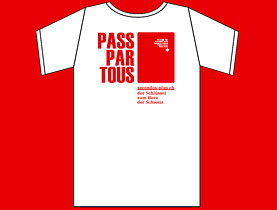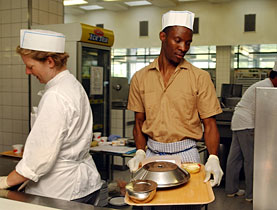Government to target foreign criminals

The government has announced its migration policy priorities for 2008, with the focus on measures to crack down on foreigners who abuse the system.
But with anti-foreigner sentiments currently running high in Switzerland, the Federal Migration Office said it also wanted to help foreigners integrate into Swiss society.
Top of the migration office’s list on Thursday was the “stringent implementation” of tougher laws on asylum seekers and foreigners which have come into effect in stages since January 1, 2007.
These changes include the requirement that asylum seekers present valid identity papers within 48 hours of entering Switzerland. The changes also make it easier for the authorities to expel asylum seekers.
Concerning immigration, the preference given to workers from the European Union (EU) and countries of the European Free Trade Association (Efta) means only highly skilled labourers from outside these blocs can apply for Swiss jobs.
Eduard Gnesa, director of the migration office, said the authorities should use existing legal means to expel law-breaking foreigners.
“If a person violates the law, his or her working or residency papers can be revoked or not renewed,” Gnesa said.
“It’s also possible under Swiss law to expel the [non-Swiss] parents of juvenile delinquents, for example, if they neglect their children or fail to comply with conditions set by the school authorities.”
This was in reference to a campaign by the rightwing Swiss People’s Party to make such expulsions mandatory. The party’s anti-foreigner stance helped it in the October elections, when it increased its representation by nine per cent in parliament, where it is the largest party.
Criminal youth
The portrayal of foreigners as criminals, especially young people from the Balkans, was enhanced recently when three Balkan-born men beat a Swiss man to death in Locarno.
But the migration office said Switzerland does not only want to be harsh with immigrants. The revised laws also include measures to help foreigners integrate into Swiss society. This means they should have easier access to the job market and will benefit from job training schemes and language courses.
“Young foreigners from asylum backgrounds have more problems integrating into the labour market and don’t have access to further education,” Mario Gattiker, responsible for the integration programme, told swissinfo.
“Pro-foreigner”
However, the focus on measures to deal with the criminal element among the country’s foreign population or integration problems overshadowed statistical trends.
There was a three per cent increase in the number of foreigners residing in Switzerland last year and this was due to an influx of workers from EU and Efta countries, most of whom have less difficulty assimilating.
The largest increase was among Germans, who now number 200,000 or 13 per cent of the nearly 1.6 million foreign residents, just behind the country’s 290,000 Italians.
Gnesa and Gattiker admitted immigrants from the EU and Efta were an important cog in the wheel of economic growth.
“We are very fortunate to have the free movement of people agreements,” Gnesa told swissinfo.
“But we Swiss also look at the problems and measures to solve them. We don’t want ghettos or a two-class society like in Britain or suburbs like in France where [immigrant youth] set cars on fire,” Gnesa explained, referring to the integration measures.
“In Switzerland, we are not anti-foreigner, but pro-foreigner.”
swissinfo, Dale Bechtel
There was a total of 1.57 million foreigners living in Switzerland at the end of 2007. This was a 3.1% increase on 2006.
The majority, or 960,000, come from EU or Efta states.
About two-thirds of the total have permanent residency status.
In 2007, 48% of newly arrived immigrants came to take up jobs. Members of the second largest group (32.3%) came to join their families.
More than 10% enrolled in Swiss schools or institutes of higher education.
Immigrants without work accounted for 3.5% of entries and refugees only 0.8%.

In compliance with the JTI standards
More: SWI swissinfo.ch certified by the Journalism Trust Initiative












You can find an overview of ongoing debates with our journalists here . Please join us!
If you want to start a conversation about a topic raised in this article or want to report factual errors, email us at english@swissinfo.ch.